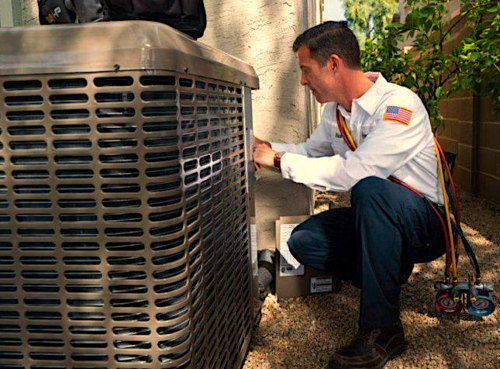Why Is My AC Blowing Mist?
November 18, 2021

Patrick Riley technician repairing an AC
Worried about that fog or the mist you see coming from your AC? Don’t worry—it usually doesn’t mean there’s something wrong with your air conditioner. The mist is just condensed water vapor that forms when cold, dry air comes into contact with humid, warm air (we’ll explain this in more detail later on).
Usually, the mist will go away on its own after a minute or two. However, if you notice a musty, dirty-sock smell or the mist doesn’t dissipate in a short while, you should contact a professional for assistance.
In this blog, we’ll explain:
- What causes the mist to form in the first place
- How to reduce the mist
- When to call a professional
Need a professional to take a look at your misting AC today? Contact Patrick Riley for a quick, efficient, and correct AC repair.
What causes the mist to form in the first place

If you've ever opened a freezer located in a warm space (like a garage), you might have noticed a white cloud of fog appear as the cold freezer air comes into contact with the garage's warm air. A similar thing happens with your AC.
Like we mentioned above, the mist coming out of your vents is just condensed water vapor. The mist forms when the air temperature falls below the dew point, which is the temperature below which water vapor begins to condense into dew/mist.
The dew point basically helps you measure when you would see this type of moisture in the air. But, the dew point isn’t always at the same level. It changes depending on how humid or dry the air is:
- The lower the humidity, the lower the dew point
- The higher the humidity, the higher the dew point
With our low humidity levels and high temperatures in Arizona, we generally don’t see the temperature falling below the dew point until monsoon season from June 15 to September 30.
During monsoon season, it’s typical to see the following weather changes:
- A drop in the temperature: 100 - 105 degrees (down from 115 degrees)
- An increase in relative humidity: Over 40% (up from 5 - 15%)
- An increase in dew point temperature: 55 - 65 degree level (up from 20 - 25 degree level)
So, what does this all have to do with your air conditioning system? Since mist forms when cold, conditioned air touches warm, unconditioned air, you’re most likely to see it on incredibly humid days when there is a lot of moisture in the air.
Does moisture in the air sound familiar? Monsoon season is the prime time to see an uptick in this phenomenon. Humidity is up, which means the dew point is, too.
But if the last thing you want to see is mist in your home, don’t panic. Typically, the mist will go away on its own after the AC runs for a minute or two. If you’re concerned about an issue with your AC unit, call Patrick Riley at 602-286-0027 or schedule an appointment.
How to reduce the mist
If you don’t want to see the mist in your home (or if it’s lasting longer than a couple of minutes), you can try the following:
- Check your air filter to see if it’s dirty
- Invest in a variable-speed AC
- Avoid turning off your air conditioner when you’re out
- Make sure your AC is the right size for your home
Check your air filter to see if it’s dirty
Your AC doesn't just cool your home; it also dehumidifies by removing warm, humid air from your air and pushing cold, dehumidified air throughout your living space.
However, when a dirty air filter blocks warm air from entering the indoor unit of the AC to be cooled, the AC has a challenging time removing humidity from your home. The higher the humidity, the more mist you’ll see.
We recommend checking and replacing the air filter once a month to prevent mist and other AC issues.
Invest in a variable-speed AC
AC system motors can run at different speeds. When you purchase an AC, you can choose between single-speed and variable-speed units. A single-speed AC works at only one speed, and it shuts off once done cooling your home.
Like a single-speed AC, variable-speed ACs blast cool air throughout your home when you turn it on. However, a variable-speed AC can adjust its speed for more precise and efficient cooling and doesn't run at 100% all the time, and it also doesn’t just shut off right away like a single-speed AC. Instead, it slows down and steadily continues cooling your home.
Because the variable-speed AC runs for more extended periods, the system has time to dehumidify your home, which—you guessed it—helps reduce the chance of mist when your AC kicks on.
Avoid turning off your air conditioner when you’re out
Picture this: You leave for the day, so you turn off your air conditioning system to save money. You don’t need it, and it’ll save money, right? Wrong.
When your air conditioner isn’t running at all, temperature and humidity levels rise in your home. That means you’re more apt to see mist come out of your vents when you do turn your AC back on.
Not to mention, turning off your air conditioner actually costs more than increasing the temperature before heading out.
Make sure your AC is the right size for your home
Getting an AC that’s the right size for your home is essential. Otherwise, you could run into mist more often than you’d like, along with high energy bills and a shortened system lifespan.
With an oversized AC, it cools your home too quickly. Then, it's not running long enough to absorb moisture and reduce your home’s humidity levels.
With an undersized AC, your system has trouble cooling your home. As a result, it could take longer to cool each room and eliminate the mist.
When to call a professional
If the mist persists, it’s time to call an HVAC professional for help. They can find what’s causing the humidity imbalance in your system and recommend the needed repair.
Additionally, if you notice a musty smell (like dirty socks), it could mean you have a mold issue in your air conditioner. Besides the unpleasant odor, breathing airborne mold spores can lead to respiratory problems. For this reason, if you notice any strange odors in addition to the mist, you’ll want to have your AC inspected for mold contamination.
Want a trusted Phoenix pro to fix your AC?

Patrick Riley AC technicians are ready to help.
You need a reliable air conditioner to keep up with the Phoenix heat. Here at Patrick Riley, we specialize in AC repairs. Our professional and licensed technicians will work hard to get your AC back to cooling your home without the mist.
Need us right away? We offer same-day service—because we know how vital functional ACs are in Phoenix, Mesa, Chandler, and surrounding Arizona cities.
Related articles:
Get 10% off (Up to $150)

Ty Lindsay is the Director of Field Operations at Patrick Riley | Isley’s and a 15-year veteran of the plumbing and HVAC trades. In 2010, Ty earned his Journeyman’s plumbing license. He became a Master Plumber five years later and earned his Journeyman HVAC technician’s license that same year. Ty’s breadth of knowledge in plumbing and HVAC includes both residential and commercial work. He’s been a loyal member of the Patrick Riley | Isley’s team since 2016.
- Posted in:
- Troubleshooting
